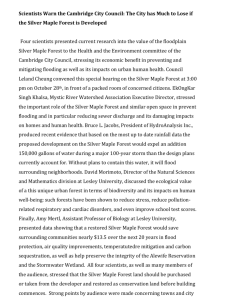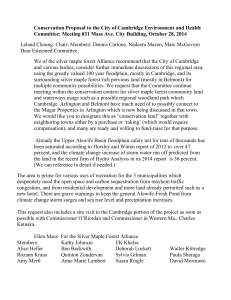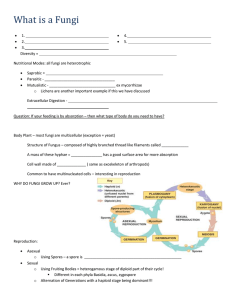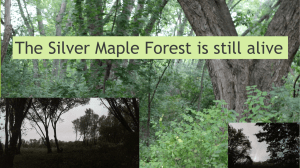Document 10600427
advertisement
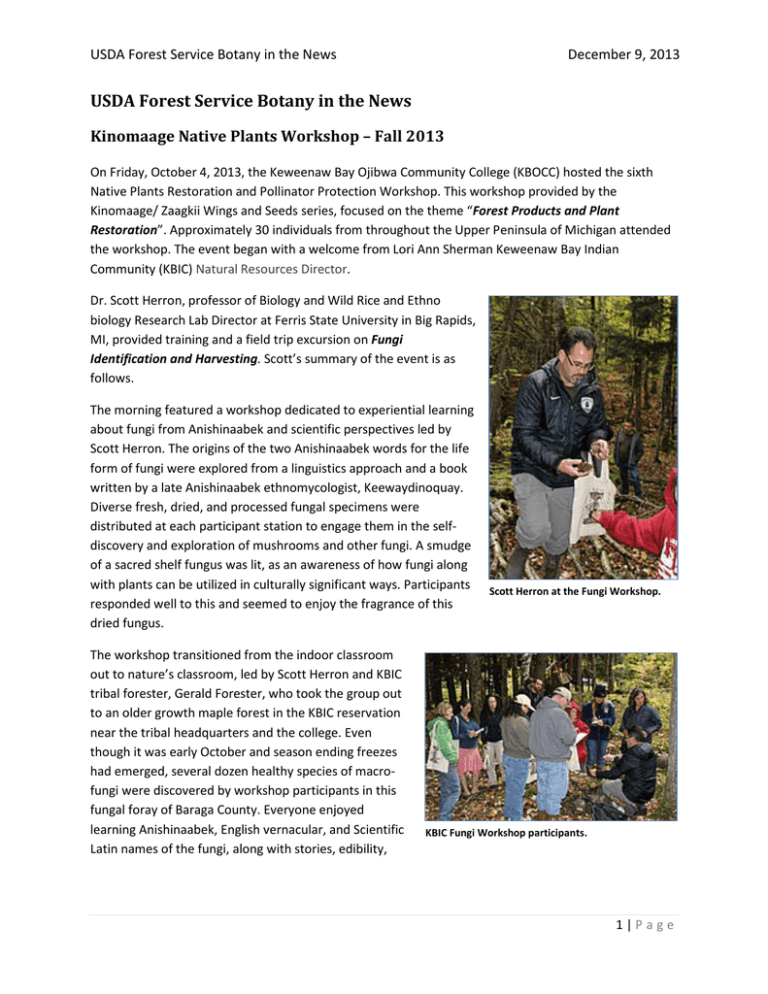
USDA Forest Service Botany in the News December 9, 2013 USDA Forest Service Botany in the News Kinomaage Native Plants Workshop – Fall 2013 On Friday, October 4, 2013, the Keweenaw Bay Ojibwa Community College (KBOCC) hosted the sixth Native Plants Restoration and Pollinator Protection Workshop. This workshop provided by the Kinomaage/ Zaagkii Wings and Seeds series, focused on the theme “Forest Products and Plant Restoration”. Approximately 30 individuals from throughout the Upper Peninsula of Michigan attended the workshop. The event began with a welcome from Lori Ann Sherman Keweenaw Bay Indian Community (KBIC) Natural Resources Director. Dr. Scott Herron, professor of Biology and Wild Rice and Ethno biology Research Lab Director at Ferris State University in Big Rapids, MI, provided training and a field trip excursion on Fungi Identification and Harvesting. Scott’s summary of the event is as follows. The morning featured a workshop dedicated to experiential learning about fungi from Anishinaabek and scientific perspectives led by Scott Herron. The origins of the two Anishinaabek words for the life form of fungi were explored from a linguistics approach and a book written by a late Anishinaabek ethnomycologist, Keewaydinoquay. Diverse fresh, dried, and processed fungal specimens were distributed at each participant station to engage them in the selfdiscovery and exploration of mushrooms and other fungi. A smudge of a sacred shelf fungus was lit, as an awareness of how fungi along with plants can be utilized in culturally significant ways. Participants responded well to this and seemed to enjoy the fragrance of this dried fungus. The workshop transitioned from the indoor classroom out to nature’s classroom, led by Scott Herron and KBIC tribal forester, Gerald Forester, who took the group out to an older growth maple forest in the KBIC reservation near the tribal headquarters and the college. Even though it was early October and season ending freezes had emerged, several dozen healthy species of macrofungi were discovered by workshop participants in this fungal foray of Baraga County. Everyone enjoyed learning Anishinaabek, English vernacular, and Scientific Latin names of the fungi, along with stories, edibility, Scott Herron at the Fungi Workshop. KBIC Fungi Workshop participants. 1|Page USDA Forest Service Botany in the News December 9, 2013 toxicity, medicinal usage, and harvesting techniques. Please contact Scott at herrons@ferris.edu with questions regarding his presentation. Learn more about Scott’s programs at Ferris State on his web page at http://www.ferris.edu/faculty/scottherron. After the foray, we returned to KBOCC for a quick lunch, followed by recognition gifts from the Cedar Tree Institute to KBIC Natural Resources staffers Karen Anderson and Evelyn Ravindran. The workshop continued with presentations by Dr. Martin Reinhardt of NMU on the Decolonizing Diet Project (DDP) he has led in the Marquette community. Marty is a Professor at Northern Michigan University’s Center for Native American Studies in Marquette, Michigan. “If I wanted to eat the foods my Native ancestors ate, what would I have to know and do?” This question came to the mind of Dr. Martin Reinhardt following the annual First Nations Food Taster at Northern Michigan University (NMU) in November 2010. “How did we eat prior to colonization in this region?” This became the topic of many discussions around the Center for Native American Studies, and blossomed into the DDP, an exploratory study of the relationship between people and Indigenous foods of the Great Lakes Region. Very few studies have ever been conducted on this subject matter, and studies that examine the physical, cultural, and legal/political dimensions are practically non-existent. The DDP chronicles the yearlong experience of 25 voluntary research subjects as they adhere to a diet consisting of 25 to 100% Indigenous foods from the Great Lakes Region. This study will provide important data for ongoing research in multiple discipline areas and it is anticipated that the generation of products such as scholarly articles, curriculum materials, a recipe book, and a documentary video. More importantly, the DDP staff believes it will serve as a catalyst for the revitalization of interconnections between humans and the world around us. To learn more about this project contact Marty Reinhardt at mreinhar@nmu.edu or the Center for Native American Studies, Northern Michigan University (http://www.nmu.edu/sites/DrupalNativeAmericanStudies/files/UserFiles/Files/PreDrupal/Components-Homepage/RYB_DDPflyer_122011.pdf). You may also learn more on the “Decolonizing Diet Project Blog” (http://decolonizingdietproject.blogspot.com/). Maple Syrup Opportunities and Operations Jerry Jondreau, Forester for the KBIC Forestry Department, provided a power point that summarized the KBIC Community Sugar Bush; U.S. Forest Service Memorandum of Understanding (MOU); and the KBIC Climate Adaptation / Sugar Maple Variant Project. The Sugar Bush incorporates tradition, community, and culture, while also providing a strong commercial potential and niche market for Tribes. Currently Michigan produces about 4% of the U.S. maple production at 148,000 gallons (2013). Highlights of the US Forest Service MOU, a framework for collaboration and cooperation, are as Jerry Jondreau, KBIC Forester. follows: technical working group /establishment of Tribal and USFS 2|Page USDA Forest Service Botany in the News December 9, 2013 contacts; guidelines for camping, harvesting, gathering and enforcement; and intertribal cooperation to share resources. The MOU is valid within the Ottawa, Hiawatha, Huron Manistee, and Chequamegon Nicolet National Forests. The Sugar Maple Variant Project recognizes the cultural importance of sugar maple to KBIC while predicting the potential loss of suitable habitat for this important species. Questions regarding Jerry’s presentation can be sent to gjondreau@kbicnsn.gov. The workshop wrapped up with Jon Magnuson of the Cedar Tree Institute sharing Potential Harvesting and Economic Opportunities/ Special Forest Products (native plants) for tribal communities, and closing reflections. Note Great Lakes Indian Fish and Wildlife Commission law officer, Heather Naigus, Tapping maple trees to collect sap for making maple syrup. worked with her son, Asa Naigus to produce a published short reflection (pg. 14) on this workshop in the winter 2013 edition of the Mazina’igan (http://www.glifwc.org/publications/mazinaigan/Winter2013/index.html). Please visit the Zaagkii Wings and Seeds website (http://wingsandseeds.org/) for more program information. 3|Page

